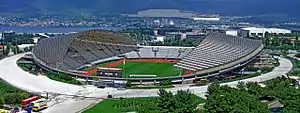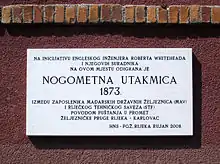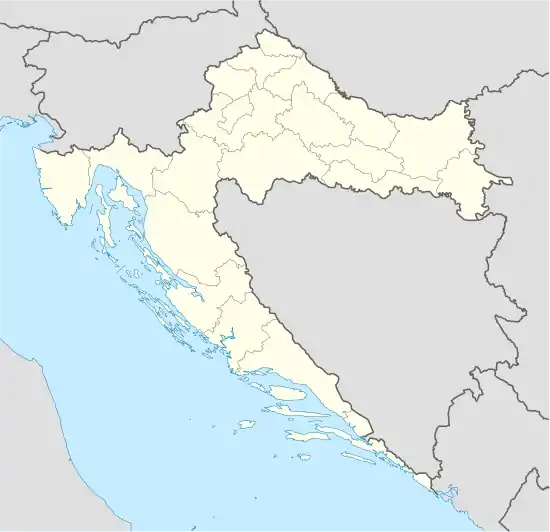Football in Croatia
Football in Croatia, called nogomet, is the most popular sport in the country and is led by the Croatian Football Federation.[1] It is played in four official components; the domestic league consists of three hierarchical echelons, and a single national team represents the entire state.
| Football in Croatia | |
|---|---|
 Home stadium of club Hajduk Split | |
| Country | Croatia |
| Governing body | Croatian Football Federation |
| National team(s) | men's national team women's national team |
National competitions | |
Club competitions | |
International competitions | |
The first Croat clubs were founded prior to the First World War and participated in the Yugoslavian league structure after Croatia became a part of Yugoslavia following the war. From 1940 to 1944, nineteen friendly matches were played by a Croatia national side representing the Second World War-era puppet states of the Banovina of Croatia and Independent State of Croatia. After the war, most of the prominent Yugoslavian clubs, including clubs in Croatia, were dissolved and replaced with new sides by Marshal Tito's Communist regime.
Today, club football in Croatia is dominated by Dinamo Zagreb. Since independence, the country has produced a string of players who have performed well in many of Europe's most highly regarded leagues and who took the national team to third place at the 1998 World Cup[1] and the final at the 2018 World Cup.
Format
The governing body of football in Croatia is the Croatian Football Federation.[2] It oversees the organization of:
- Leagues:
- Cup tournaments:
- National teams:
Note: the aforementioned competitions are for men if not stated differently. Women's football exists but is much less developed or popular.
Teams
According to many surveys conducted by multiple newspapers, the most popular club in Croatia is Dinamo Zagreb which is also the most successful club. Their main rivals and second biggest club in Croatia is Hajduk Split, followed by HNK Rijeka and NK Osijek.
Seasons
The following articles detail major results and events in each footballing season since the early 1990s, when the Croatian First Football League was established. Each article provides final league standings for that season, as well as details on cup results, Croatia national football team results, and a summary of any other important events during the season.
| 1990s | 1990–91 | 1991–92 | 1992–93 | 1993–94 | 1994–95 | 1995–96 | 1996–97 | 1997–98 | 1998–99 | 1999–2000 |
| 2000s | 2000–01 | 2001–02 | 2002–03 | 2003–04 | 2004–05 | 2005–06 | 2006–07 | 2007–08 | 2008–09 | 2009–10 |
| 2010s | 2010–11 | 2011–12 | 2012–13 | 2013–14 | 2014–15 | 2015–16 | 2016–17 | 2017–18 | 2018–19 | 2019–20 |
| 2020s | 2020–21 |
History

The earliest record of football in Croatia dates from 1873, when English construction workers played the game in Rijeka.[3] The first known football match involving local population was played in 1880 in Županja, between English workers of The Oak Extract Company and local youths.[3] The sport was further popularized in Croatia by Franjo Bučar in the 1890s.[4] Its Croatian name, nogomet, was coined by the linguist Slavko Rutzner Radmilović in 1893 or 1894.[5] The name was accepted into Slovenian as well.
The earliest clubs were founded before World War I – HAŠK and PNIŠK in 1903, Hajduk and Građanski in 1911, etc. However, first Croatian football club Bačka from Subotica was founded in 1901 in the Kingdom of Hungary. In Bosnia and Herzegovina Croatian club Zrinjski Mostar is the oldest in the country and it was founded in 1905. The Croatian Football Federation was founded in 1912.
After World War I, the Croatians played a major part in the founding of the first football federation of the Kingdom of Serbs, Croats and Slovenes, later named the Football Association of Yugoslavia, and its headquarters were initially in Zagreb before they were moved to Belgrade in 1929. During this time, the talented Ico Hitrec played football. In 1927, Hajduk Split took part in the inaugural Mitropa Cup for Central European clubs.
Croatia had its first international football match on April 2, 1940 against Switzerland. During World War II, the Croatian Football Federation joined FIFA as a representative of the Independent State of Croatia, but this was contentious and short-lived as was the fascist puppet-state. After the war, football was resumed in the second Yugoslavia. The communist regime in the new state quickly moved to ban all clubs who had either participated in the Croatian championship or bore Croatian national names. Many clubs were said to have links to the Ustaše. Victims of this disbanding included top-sides Concordia, HAŠK and Građanski, as well as the major Croatian clubs in today's Bosnia and Herzegovina SAŠK and HŠK Zrinjski Mostar. The largest club to avoid disbanding was Hajduk Split who had refused to participate in the Croatian competition.
At this point several other major clubs were founded – today's GNK Dinamo Zagreb, HNK Rijeka and NK Osijek, to name a few. Most clubs had to maintain loyalty to the regime, and it was common for clubs to have a communist red star as part of their emblem.
Over the following decades, the Croatian clubs performed well in the Yugoslav First League and the Yugoslav Cup. Hajduk and Dinamo formed one half of the Big Four of Yugoslav football (the other two being FK Partizan and Red Star Belgrade). In 1967, Zlatko Čajkovski of German club Bayern Munich became the only Croatian manager to win the European Cup Winners' Cup.
After Croatia gained independence in the 1990s, the football federation was reconstituted and joined the international associations.[6] The Croatian internationals from the 1987 FIFA World Youth Championship-winning team went on to achieve more success, spawning the Golden Generation who won third place at the 1998 FIFA World Cup.[7] Since then, Croatia has continued to produce top players. At the more recent Euro 2008, they famously beat 2006 FIFA World Cup bronze medalists Germany 2–1 in a shock win but exited the tournament courtesy of a penalty shoot-out against Turkey in the quarterfinals.
Clubs in European competitions
- Hajduk Split is the only Croatian club to date—either during the Yugoslav period or since independence—to have played in the knockout stages of the European Cup or UEFA Champions League, having reached the quarter-finals on three occasions (in 1975–76, 1979–80 and 1994–95).
- Dinamo Zagreb have qualified for the Champions League group stage on seven occasions (in 1998–99, 1999–2000, 2011–12, 2012–13, 2015–16, 2016–17 and 2019-2020) but have yet to progress further.
- Hajduk are also the only Croatian club to have advanced past the round of sixteen of the UEFA Cup/Europa League, reaching the semi-finals in 1983–84 and the quarterfinals in 1985–86. They also reached the UEFA Cup's last sixteen in 1981–82 and 1986–87, while Dinamo Zagreb were eliminated in the same round in 1997–98 and 2018-19.
- Dinamo Zagreb had succes winning the Inter-Cities Fairs Cup in 1967 which is the only European trophy won by Croatian clubs. Croatian clubs also had success in the defunct UEFA Cup Winners' Cup. Both Dinamo Zagreb (1960–61) and Hajduk Split (1972–73) reached the semi-finals of the competitions. Dinamo have also reached the quarterfinals in 1964–65 and 1969–70, while Hajduk were eliminated at that stage in 1977–78. UEFA Cup Winners' Cup is also the only European competition that has seen Croatian clubs other than Dinamo and Hajduk reach the advanced stages. Rijeka reached the quarterfinals in the 1979–80 edition, while Varteks advanced to the quarterfinals in 1998–99, the last edition of the competition.
Best results
The table below lists Croatian clubs' best results in elimination rounds of European club competitions:
| Competition | Season | Round | Team 1 | Agg. | Team 2 | 1st leg | 2nd leg |
|---|---|---|---|---|---|---|---|
| UCWC | 1960–61 | SF | Fiorentina |
4–2 | 3–0 | 1–2 | |
| UCWC | 1972–73 | SF | Leeds United |
1–0 | 1–0 | 0–0 | |
| EC | 1975–76 | QF | Hajduk Split |
2–3 | 2–0 | 0–3 (aet) | |
| EC | 1979–80 | QF | Hamburger SV |
3–3 (a) | 1–0 | 2–3 | |
| UC | 1983–84 | SF | Hajduk Split |
2–2 (a) | 2–1 | 0–1 | |
| UCL | 1994–95 | QF | Hajduk Split |
0–3 | 0–0 | 0–3 | |
| UC | 1997–98 | R16 | Croatia Zagreb |
1–2 | 1–1 | 0–1 | |
| EL | 2018–19 | R16 | Dinamo Zagreb |
1–3 | 1–0 | 0–3 (aet) | |
| UCWC | 1998–99 | QF | Varteks |
1–3 | 0–0 | 1–3 |
Footballers in international club competitions
The following table lists all Croatian players who are credited to win an international final (either appeared in the final, being unused substitutes or were in the squad in earlier rounds of the tournament). It does not include Croatians who were considered Yugoslav players prior to Croatia's independence in 1991.
As of 2020 a total of eleven Croatian players are credited as winning the Champions League: Alen Bokšić, Zvonimir Boban, Davor Šuker, Dario Šimić, Igor Bišćan, Mario Mandžukić, Luka Modrić, Ivan Rakitić, Mateo Kovačić, Dejan Lovren and Ivan Perišić, although Šimić, Bišćan, Kovačić and Lovren did not appear in the finals.[8] In terms of appearances, thirteen players have played in the final (Bokšić, Boban, Šuker, Živković, Babić, Tudor, Pršo, Olić, Mandžukić, Modrić, Rakitić, Lovren and Perišić), but only five players appeared more than once – Bokšić (1993, 1997), Boban (1994, 1995), Olić (2010, 2012), Mandžukić (2013, 2017) and Modrić (2014, 2016, 2017, 2018). Two Croatian players have scored a goal in the final match, Mandžukić in the 2013 and 2017 final, and Rakitić in the 2015 final.
As of 2019 a total of seven Croatian players are credited as winning the Europa League: Mario Stanić, Ivica Olić, Ivica Križanac, Darijo Srna, Ivan Rakitić, Šime Vrsaljko and Mateo Kovačić – although Stanić did not appear for his club in the final. The only Croatian player to have scored a goal in the final match was Nikola Kalinić in the 2015 final.[9]
| Ranking | Name | Team(s) | Years | CL | EL | SC | FCWC | CWC | IC | Total |
|---|---|---|---|---|---|---|---|---|---|---|
| 1 | Luka Modrić | Real Madrid | 2014–2018 | 4 | 0 | 3 | 3 | 0 | 0 | 10 |
| 2 | Mateo Kovačić | Real Madrid, Chelsea | 2016–2019 | 3 | 1 | 2 | 2 | 0 | 0 | 8 |
| 3 | Dario Šimić | Milan | 2003–2007 | 2 | 0 | 1 | 1 | 0 | 0 | 4 |
| 4 | Ivan Rakitić | Sevilla, Barcelona | 2014–2015 | 1 | 1 | 1 | 1 | 0 | 0 | |
| 5 | Alen Bokšić | Marseille, Juventus, Lazio | 1993–1999 | 1 | 0 | 0 | 0 | 1 | 1 | 3 |
| 6 | Mario Mandžukić | Bayern Munich | 2013 | 1 | 0 | 1 | 1 | 0 | 0 | |
| 7 | Zvonimir Boban | Milan | 1994 | 1 | 0 | 1 | 0 | 0 | 0 | 2 |
| 8 | Davor Šuker | Real Madrid | 1998 | 1 | 0 | 0 | 0 | 0 | 1 | |
| 9 | Igor Bišćan | Liverpool | 2001–2005 | 1 | 0 | 1 | 0 | 0 | 0 | |
| 10 | Ivica Križanac | Zenit Saint Petersburg | 2008 | 0 | 1 | 1 | 0 | 0 | 0 | |
| 11 | Robert Jarni | Real Madrid | 1998 | 0 | 0 | 0 | 0 | 0 | 1 | 1 |
| 12 | Mario Stanić | Parma | 1999 | 0 | 1 | 0 | 0 | 0 | 0 | |
| 13 | Niko Kovač | Bayern Munich | 2001 | 0 | 0 | 0 | 0 | 0 | 1 | |
| 14 | Robert Kovač | Bayern Munich | 2001 | 0 | 0 | 0 | 0 | 0 | 1 | |
| 15 | Ivica Olić | CSKA Moscow | 2005 | 0 | 1 | 0 | 0 | 0 | 0 | |
| 16 | Darijo Srna | Shakhtar Donetsk | 2009 | 0 | 1 | 0 | 0 | 0 | 0 | |
| 17 | Šime Vrsaljko | Atlético Madrid | 2018 | 0 | 1 | 0 | 0 | 0 | 0 | |
| 18 | Nikola Kalinić | Atlético Madrid | 2018 | 0 | 0 | 1 | 0 | 0 | 0 | |
| 19 | Dejan Lovren | Liverpool | 2019 | 1 | 0 | 0 | 0 | 0 | 0 | |
| 20 | Ivan Perišić | Bayern Munich | 2020 | 1 | 0 | 0 | 0 | 0 | 0 | |
Futsal
Futsal, called mali nogomet (lit. "small football") in Croatia, is also widely played and is sometimes considered as a mini football league. It is often taught in schools and also played by football professionals as a pastime.
The Croatian First League of Futsal is the top-tier futsal competition.
Fans
The Croatian football fans organize in various fan groups such as the Torcida (Hajduk), Bad Blue Boys (Dinamo), Armada (Rijeka), Kohorta (Osijek), etc.
On the international games, the Croatian fans usually wear the checkerboard colors red and white, as they are on the Croatian coat of arms.
References
- "Croatia Is Basking In Its Surprising Soccer Success The Team, Toughened By War, Has Advanced To The Semifinals In Its First Trip To The Tournament. - Philly.com". Articles.philly.com. 1998-07-09. Retrieved 2014-03-06.
- "When Saturday Comes – Power shifts at the top of Croatian football". Wsc.co.uk. 2012-07-09. Archived from the original on 2016-04-25. Retrieved 2014-03-06.
- Marković 2012, p. 307.
- Marković 2012, pp. 308–309.
- Marković 2012, pp. 309, 328.
- Jamie Jackson. "Football: Why are they all better than us? | Football | The Observer". Theguardian.com. Retrieved 2014-03-06.
- Launey, Guy De (2013-05-02). "BBC News – What is Croatia's secret to sporting success?". Bbc.co.uk. Retrieved 2014-03-06.
- "Olić osmi hrvatski igrač u finalu Lige prvaka". Sportal.net (in Croatian). HINA. Retrieved 16 March 2011.
- Bariša, Mladen (20 May 2009). "Finale Kupa UEFA: Torcida će u Istanbulu nagovarati Srnu da se vrati u Hajduk". Slobodna Dalmacija (in Croatian). Retrieved 16 March 2011.
Sources
- "Hrvatska". Nogometni leksikon (in Croatian). Miroslav Krleža Institute of Lexicography. Retrieved 19 December 2020.
- Marković, Ivan (December 2012). "O počecima hrvatskoga nogometa" [On the beginnings of the Croatian word nogomet (E. football)] (PDF). Croatica (in Croatian). 6 [36] (6 [56]): 305–328. Retrieved 30 August 2018.
External links
- League321.com – Croatian football league tables, records & statistics database. (in English)
